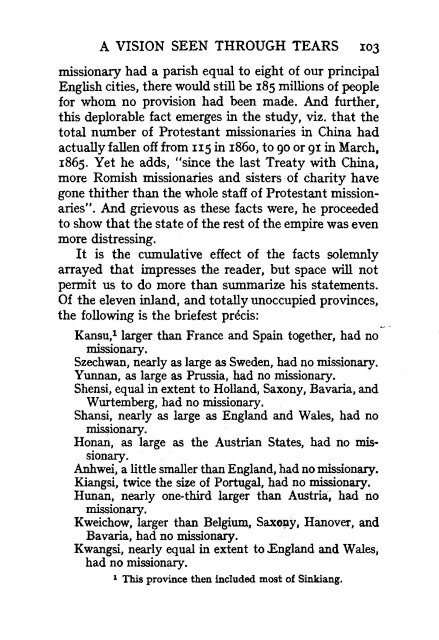HUDSON TAYLOR The man who believed God by Marshall Broomhall
This book should be required reading for any and all future missionaries. Broomhall does the Christian world a great service by detailing Hudson Taylor's successes as well as his trials. The most remarkable feature of this book is the faith of Hudson Taylor. In the midst of incredible adversity this man abandoned himself to Jesus and the promises of Scripture. He rested solely on the provision of God, letting no man know his need. Throughout the book, Taylor's adversities and God's deliverances are a source of encouragement and inspiration that will lift the spirits of any true believer to "cast all your cares on Him because He cares for you." This book is an excellent read about a life well-lived and a spiritual journey of great depth.
This book should be required reading for any and all future missionaries. Broomhall does the Christian world a great service by detailing Hudson Taylor's successes as well as his trials. The most remarkable feature of this book is the faith of Hudson Taylor. In the midst of incredible adversity this man abandoned himself to Jesus and the promises of Scripture. He rested solely on the provision of God, letting no man know his need. Throughout the book, Taylor's adversities and God's deliverances are a source of encouragement and inspiration that will lift the spirits of any true believer to "cast all your cares on Him because He cares for you."
This book is an excellent read about a life well-lived and a spiritual journey of great depth.
Create successful ePaper yourself
Turn your PDF publications into a flip-book with our unique Google optimized e-Paper software.
A VISION SEEN THROUGH TEARS 103<br />
missionary had a parish equal to eight of our principal<br />
English cities, there would still be 185 millions of people<br />
for <strong>who</strong>m no provision had been made. And further,<br />
this deplorable fact emerges in the study, viz. that the<br />
total number of Protestant missionaries in China had<br />
actually fallen off from II5 in 186o, to 90 or 91 in March,<br />
1865. Yet he adds, "since the last Treaty with China,<br />
more Romish missionaries and sisters of charity have<br />
gone thither than the <strong>who</strong>le staff of Protestant missionaries".<br />
And grievous as these facts were, he proceeded<br />
to show that the state of the rest of the empire was even<br />
more distressing.<br />
It is the cumulative effect of the facts solemnly<br />
arrayed that impresses the reader, but space will not<br />
permit us to do more than summarize his statements.<br />
Of the eleven inland, and totally unoccupied provinces,<br />
the following is the briefest precis:<br />
Kansu, 1 larger than France and Spain together, had no<br />
missionary.<br />
Szechwan, nearly as large as Sweden, had no missionary.<br />
Yunnan, as large as Prussia, had no missionary.<br />
Shensi, equal in extent to Holland, Saxony, Bavaria, and<br />
Wurtemberg, had no missionary.<br />
Shansi, nearly as large as England and Wales, had no<br />
missionary.<br />
Honan, as large as the Austrian States, had no missionary.<br />
Anhwei, a little smaller than England, had no missionary.<br />
Kiangsi, twice the size of Portugal, had no missionary.<br />
Hunan, nearly one-third larger than Austria~ had no<br />
missionary.<br />
Kweichow, larger than Belgium, Saxo~y, Hanover, and<br />
Bavaria, had no missionary.<br />
Kwangsi, nearly equal in extent to .England and Wales,<br />
had no missionary.<br />
1 This province then included most of Sinkiang.

















